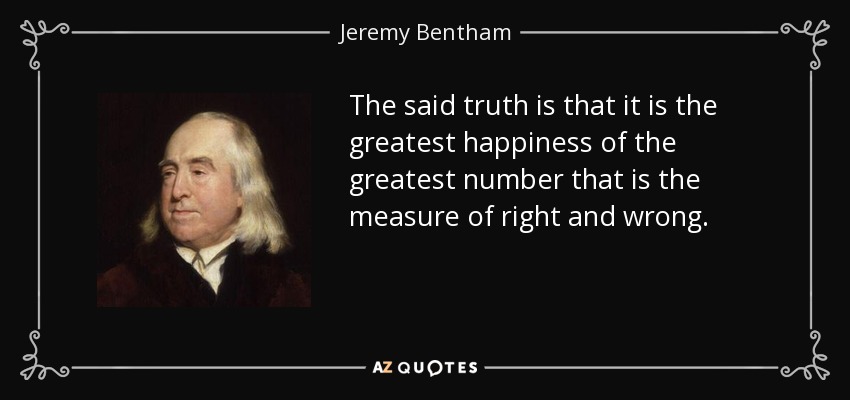The felicific calculus is an algorithm formulated by utilitarian philosopher Jeremy Bentham (1747–1832) for calculating the degree or amount of pleasure that a specific action is likely to cause. Bentham, an ethical hedonist, believed the moral rightness or wrongness of an action to be a function of the amount of pleasure or pain that it produced. The felicific calculus could, in principle at least, determine the moral status of any considered act. The algorithm is also known as the utility calculus, the hedonistic calculus and the hedonic calculus.
To be included in this calculation are several variables (or vectors), which Bentham called "circumstances". These are:
- Intensity: How strong is the pleasure?
- Duration: How long will the pleasure last?
- Certainty or uncertainty: How likely or unlikely is it that the pleasure will occur?
- Propinquity or remoteness: How soon will the pleasure occur?
- Fecundity: The probability that the action will be followed by sensations of the same kind.
- Purity: The probability that it will not be followed by sensations of the opposite kind.
- Extent: How many people will be affected? (1)
Jeremy Bentham, jurist and political reformer, is the philosopher whose name is most closely associated with the foundational era of the modern utilitarian tradition. Earlier moralists had enunciated several of the core ideas and characteristic terminology of utilitarian philosophy, most notably John Gay, Francis Hutcheson, David Hume, Claude-Adrien Helvétius and Cesare Beccaria, but it was Bentham who rendered the theory in its recognisably secular and systematic form and made it a critical tool of moral and legal philosophy and political and social improvement.
In 1776, he first announced himself to the world as a proponent of utility as the guiding principle of conduct and law in A Fragment on Government. In An Introduction to the Principles of Morals and Legislation (printed 1780, published 1789), as a preliminary to developing a theory of penal law he detailed the basic elements of classical utilitarian theory. The penal code was to be the first in a collection of codes that would constitute the utilitarian pannomion, a complete body of law based on the utility principle, the development of which was to engage Bentham in a lifetime’s work and was to include civil, procedural, and constitutional law.
As a by-product, and in the interstices between the sub-codes of this vast legislative edifice, Bentham’s writings ranged across ethics, ontology, logic, political economy, judicial administration, poor law, prison reform, international law, education, religious beliefs and institutions, democratic theory, government, and administration. In all these areas he made major contributions that continue to feature in discussions of utilitarianism, notably its moral, legal, economic and political forms. Upon this rests Bentham’s reputation as one of the great thinkers in modern philosophy.(2)


No comments:
Post a Comment